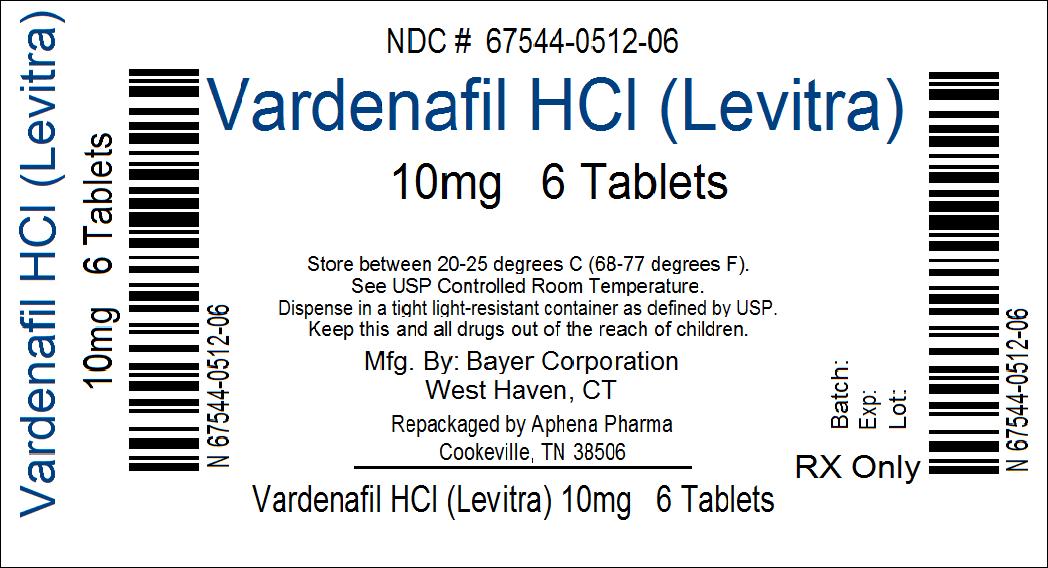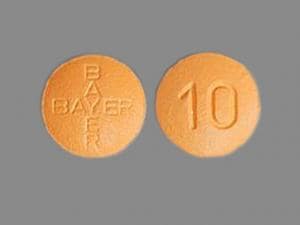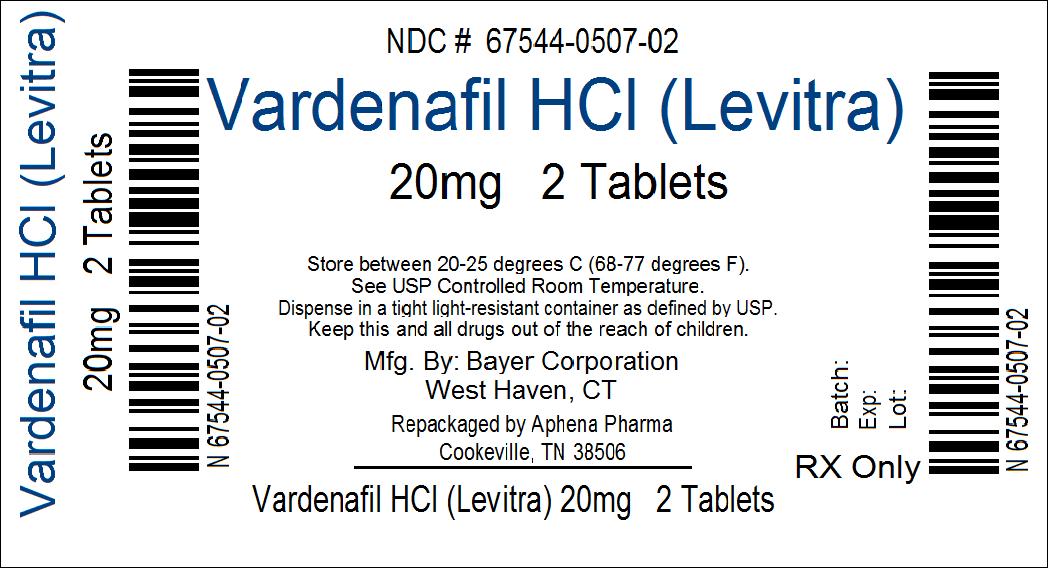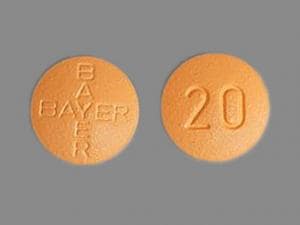Levitra
Generic name: vardenafil
Brand names: Levitra, Staxyn
Drug class: Impotence agents
Medically reviewed by A Ras MD.
What is Levitra?
Levitra is a prescription medicine taken by mouth for the treatment of erectile dysfunction (ED) in men.
Description
LEVITRA® is an oral therapy for the treatment of erectile dysfunction. This monohydrochloride salt of vardenafil is a selective inhibitor of cyclic guanosine monophosphate (cGMP)-specific phosphodiesterase type 5 (PDE5).
Vardenafil HCl is designated chemically as piperazine, 1-[[3-(1,4-dihydro-5-methyl-4-oxo-7-propylimidazo[5,1-f ][1,2,4]triazin-2-yl)-4-ethoxyphenyl]sulfonyl]-4-ethyl-, monohydrochloride and has the following structural formula:

Vardenafil HCl is a nearly colorless, solid substance with a molecular weight of 579.1 g/mol and a solubility of 0.11 mg/mL in water. LEVITRA is formulated as orange, round, film-coated tablets with “BAYER” cross debossed on one side and “2.5”, “5”, “10”, and “20” on the other side corresponding to 2.5 mg, 5 mg, 10 mg, and 20 mg of vardenafil, respectively. In addition to the active ingredient, vardenafil HCl, each tablet contains microcrystalline cellulose, crospovidone, colloidal silicon dioxide, magnesium stearate, hypromellose, polyethylene glycol, titanium dioxide, yellow ferric oxide, and red ferric oxide.
Mechanism of Action
Penile erection is a hemodynamic process initiated by the relaxation of smooth muscle in the corpus cavernosum and its associated arterioles. During sexual stimulation, nitric oxide is released from nerve endings and endothelial cells in the corpus cavernosum. Nitric oxide activates the enzyme guanylate cyclase resulting in increased synthesis of cyclic guanosine monophosphate (cGMP) in the smooth muscle cells of the corpus cavernosum. The cGMP in turn triggers smooth muscle relaxation, allowing increased blood flow into the penis, resulting in erection.
The tissue concentration of cGMP is regulated by both the rates of synthesis and degradation via phosphodiesterases (PDEs). The most abundant PDE in the human corpus cavernosum is the cGMP-specific phosphodiesterase type 5 (PDE5); therefore, the inhibition of PDE5 enhances erectile function by increasing the amount of cGMP. Because sexual stimulation is required to initiate the local release of nitric oxide, the inhibition of PDE5 has no effect in the absence of sexual stimulation.
In vitro studies have shown that vardenafil is a selective inhibitor of PDE5. The inhibitory effect of vardenafil is more selective on PDE5 than for other known phosphodiesterases (>15-fold relative to PDE6, >130-fold relative to PDE1, >300-fold relative to PDE11, and >1,000-fold relative to PDE2, 3, 4, 7, 8, 9, and 10).
What is the most important information I should know about Levitra?
Levitra can cause your blood pressure to drop suddenly to an unsafe level if it is taken with certain other medicines. With a sudden drop in blood pressure, you could get dizzy, faint, or have a heart attack or stroke.
Do not take Levitra if you:
- Take any medicines called “nitrates” (often used to control chest pain, also known as angina).
- Use recreational drugs called “poppers” like amyl nitrate and butyl nitrate.
- Take riociguat (Adempas), a guanulate cyclase stimulator, a medicine that treats pulmonary arterial hypertension and chronic-thromboembolic pulmonary hypertension.
(See “Who should not take Levitra?”)
Tell all your healthcare providers that you take Levitra. If you need emergency medical care for a heart problem, it will be important for your healthcare provider to know when you last took Levitra.
Who should not take Levitra?
Do not take Levitra if you:
- Take any medicines called “nitrates” (See “What important information should you know about Levitra?”). Nitrates are commonly used to treat angina. Angina is a symptom of heart disease and can cause pain in your chest, jaw, or down your arm.
- Medicines called nitrates include nitroglycerin that is found in tablets, sprays, ointments, pastes, or patches. Nitrates can also be found in other medicines such as isosorbide dinitrate or isosorbide mononitrate. Some recreational drugs called “poppers” also contain nitrates, such as amyl nitrate and butyl nitrate. Do not use Levitra if you are using these drugs. Ask your doctor or pharmacist if you are not sure if any of your medicines are nitrates.
- Take riociguat, a guanylate cyclase stimulator, a medicine that treats pulmonary arterial hypertension and chronic-throembolic pulmonary hypertension.
- Have been told by your healthcare provider to not have sexual activity because of health problems. Sexual activity can put an extra strain on your heart, especially if your heart is already weak from a heart attack or heart disease.
What should I tell my healthcare provider before taking Levitra?
Before taking Levitra, tell your doctor about all your medical problems, including if you:
- Have heart problems such as angina, heart failure, irregular heartbeats, or have had a heart attack. Ask your doctor if it is safe for you to have sexual activity.
- Have low blood pressure or have high blood pressure that is not controlled.
- Have pulmonary hypertension.
- Have had a stroke.
- Have had a seizure.
- Or any family members have a rare heart condition known as prolongation of the QT interval (long QT syndrome).
- Have liver problems.
- Have kidney problems and require dialysis.
- Have retinitis pigmentosa, a rare genetic (runs in families) eye disease
- Have ever had severe vision loss, or if you have an eye condition called non-arteritic anterior ischemic optic neuropathy (NAION).
- Have stomach ulcers.
- Have a bleeding problem.
- Have a deformed penis shape or Peyronie’s disease.
- Have had an erection that lasted more than 4 hours.
- Have blood cell problems such as sickle cell anemia, multiple myeloma, or leukemia.
- Have hearing problems.
Can other medications affect Levitra?
Tell your doctor about all the medicines you take including prescription and non-prescription medicines, vitamins, and herbal supplements. Levitra and other medicines may affect each other. Always check with your doctor before starting or stopping any medicines. Especially tell your doctor if you take any of the following:
- Medicines called nitrates (see “What important information should you know about Levitra?”).
- Ketoconazole or itraconazole (such as Nizoral or Sporanox).
- Ritonavir (Norvir) or indinavir sulfate (Crixivan) saquinavir (Fortavase or Invirase) or atazanavir (Reyataz).
- Erythromycin or clarithromycin.
- Medicines called alpha-blockers. These include Hytrin (terazosin HCl), Flomax (tamsulosin HCl), Cardura (doxazosin mesylate), Minipress (prazosin HCl), Rapaflo (silodosin) or Uroxatral (alfuzosin HCl). Alpha-blockers are sometimes prescribed for prostate problems or high blood pressure. In some patients the use of PDE5 inhibitor drugs, including Levitra, with alpha-blockers can lower blood pressure significantly leading to fainting. You should contact the prescribing physician if alpha-blockers or other drugs that lower blood pressure are prescribed by another healthcare provider.
- Medicines that treat abnormal heartbeat. These include quinidine, procainamide, amiodarone and sotalol.
- Other medicines or treatments for ED.
How should I take Levitra?
Take Levitra exactly as your doctor prescribes. Do not take more than one Levitra a day. Doses should be taken at least 24 hours apart. Some men can only take a low dose of Levitra because of medical conditions or medicines they take. Your doctor will prescribe the dose that is right for you.
- If you are older than 65 or have liver problems, your doctor may start you on a lower dose of Levitra.
- If you have prostate problems or high blood pressure, for which you take medicines called alpha-blockers, your doctor may start you on a lower dose of Levitra.
- If you are taking certain other medicines your doctor may prescribe a lower starting dose and limit you to one dose of Levitra in a 72-hour (3 days) period.
Take 1 Levitra tablet about 1 hour (60 minutes) before sexual activity. Some form of sexual stimulation is needed for an erection to happen with Levitra. Levitra may be taken with or without meals.
Do not change your dose of Levitra without talking to your doctor. Your doctor may lower your dose or raise your dose, depending on how your body reacts to Levitra.
Call your doctor or emergency room immediately if you accidentally took more Levitra than prescribed.
What are the possible side effects of Levitra?
The most common side effects with Levitra are. headache, flushing, stuffy or runny nose, indigestion, upset stomach, dizziness or back pain. These side effects usually go away after a few hours. Call your doctor if you get a side effect that bothers you or one that will not go away.
Levitra may uncommonly cause:
- An erection that won’t go away (priapism). If you get an erection that lasts more than 4 hours, get medical help right away. Priapism must be treated as soon as possible or lasting damage can happen to your penis including the inability to have erections.
- Color vision changes, such as seeing a blue tinge to objects or having difficulty telling the difference between the colors blue and green.
In rare instances, men taking PDE5 inhibitors (oral erectile dysfunction medicines, including Levitra) reported a sudden decrease or loss of vision in one or both eyes. It is uncertain whether PDE5 inhibitors directly cause the vision loss. If you experience a sudden decrease or loss of vision, stop taking PDE5 inhibitors, including Levitra, and call a doctor right away.
Sudden loss or decrease in hearing, sometimes with ringing in the ears and dizziness, has been rarely reported in people taking PDE5 inhibitors, including Levitra. It is not possible to determine whether these events are related directly to the PDE5 inhibitors, to other diseases or medications, to other factors, or to a combination of factors. If you experience these symptoms, stop taking Levitra and contact a doctor right away.
These are not all the side effects of Levitra. For more information, ask your doctor or pharmacist.
Call your doctor for medical advice about side effects. You may report side effects to FDA at 1-800-FDA-1088.
General information about the safe and effective use of Levitra
Medicines are sometimes prescribed for conditions other than those described in patient information leaflets. Do not use Levitra for a condition for which it was not prescribed. Do not give Levitra to other people, even if they have the same symptoms that you have. It may harm them.
This leaflet summarizes the most important information about Levitra. If you would like more information, talk with your healthcare provider. You can ask your doctor or pharmacist for information about Levitra that is written for health professionals.
For more information you can also visit www.Levitra.com, or call 1-888-825-5249.
How should I store Levitra?
- Store Levitra at room temperature between 59–86° F (15–30° C).
- Keep Levitra and all medicines out of the reach of children.
What are the ingredients in Levitra?
Active Ingredient: vardenafil hydrochloride
Inactive Ingredients: microcrystalline cellulose, crospovidone, colloidal silicon dioxide, magnesium stearate, hypromellose, polyethylene glycol, titanium dioxide, yellow ferric oxide, and red ferric oxide.
Label
PRINCIPAL DISPLAY PANEL
- NDC: 67544-512
Vardenafil HCl (Levitra®) 10mg
Rx Only


PRINCIPAL DISPLAY PANEL


